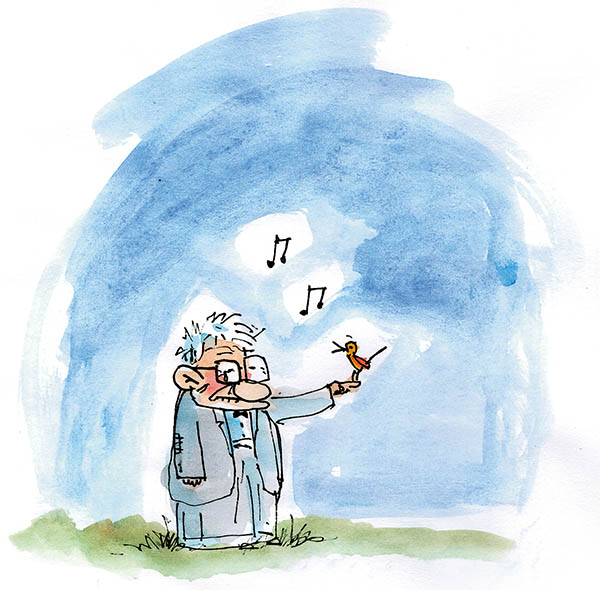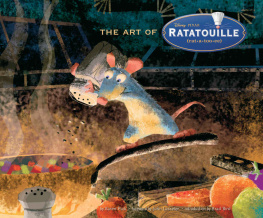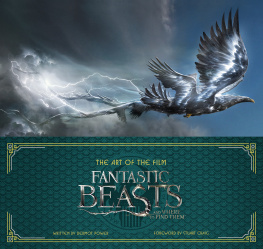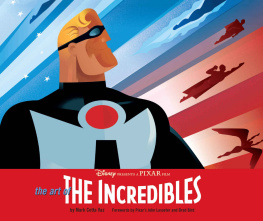
Daniel Arriaga | pencil | 2007

Daniel Arriaga | digital | 2007
Copyright 2009 by Disney Enterprises, Inc./Pixar.
All rights reserved. No part of this book may be reproduced in any form without written permission from the publisher.
ISBN: 978-0-8118-6602-6 (hc)
ISBN: 978-1-4521-4760-4 (epub, mobi)
Designed by Glen Nakasako, Smog Design, Inc.
Chronicle Books LLC
680 Second Street
San Francisco, California 94107
www.chroniclebooks.com

Patrick McDonnell | watercolor | 2005
FOREWORD

Ricky Nierva | gouache | 2004
U P BEGAN WITH THE THOUGHT OF ESCAPE. Theres a reason most animators became animators: Were socially challenged. We were the last ones picked for the baseball team, the pasty, awkward kids who sat off by themselves and didnt talk to others. For me, it was a lot easier to draw someone than to talk with them.
I like to think Ive gotten better at it as Ive grown, but more often than I care to admit, the world is still too much. Too many meetings. High-pressure social situations. People everywhere! I find myself plotting how to get marooned on a desert island. I start to understand why folks grow beards, build shanties in the forest, and write crazed manifestos on how paper clips lead to the downfall of humanity.
Okay, I dont actually understand the beard part. But getting away from it all? Sign me up.
As it turned out, I wasnt the only one who felt this way. Bob Peterson and I got to talking about it one afternoon. And as tends to happen around here, this talk led to an idea for a movie. It became the story of Carl Fredricksen and his floating house.
Odd as it was, the image of a floating house captured that feeling of escaping the world. At the same time, developing a new film meant that Bob and I got to mimic Carl: Wed sit at our desks, squirreled away from the hustle and bustle of the other films in production, to write and draw.
There were times when we thought to ourselves, An old man in a floating house? With a Wilderness Explorer and a talking dog? What are we thinking? Whos going to connect with this? One look through this book and youll find that Bob and I werent the only ones who did.
Four years later, more than 300 of us are floating along in our studio-sized house, making this movie. And although from time to time I still long to escape from it all, Im so happy to have had the chance to work with these amazing people. As Carl discovers, its the people youre with who make the adventure worthwhile. I wish you could all be as lucky as I was to know them. At least youll get to meet them though their artwhich is probably more than you would if we were all on the same baseball team.
Pete Docter

Albert Lozano | marker | 2008
Introduction

Nat McLaughlin | digital | 2006
Fantasy, if its really convincing, cant become dated for the simple reason that it represents a flight into a dimension that lies beyond the reach of time.
Walt Disney
F ROM ALICE TO DOROTHY GALE, FROM Wendy Darling to Harry Potter, the dreamers of modern imagination are, more often than not, children. Their fantastic journeys are a symbolic rite of passage, taking them from callow youth to responsible adult.
But why should kids have all the fun?
Meet balloonist Carl Fredricksen, the atypical senior citizen who courageously floats up, up, and away into the azure skies of his own unrealized ambitions.
Carls journey begins in his childhood in the 1930s. He and his friend Ellie, inspired by their hero, explorer Charles Muntz, dream of soaring with Muntz to the wilds of South America, far away from their quiet Midwestern lives.
Sadly, though, dreams have a way of eluding our grasp, as adulthood, marriage, work, and the other realities of life intervene. Still, Carl and Ellie keep their hopes of adventure alive, even as they are married and time slips away. But when Ellie dies many years later, Carl is lost without his treasured wife. To make matters worse, their home is threatened by encroaching development.
When the world threatens to take Carls house his last connection to his wifeCarl does what any normal seventy-eight-year-old man would do, says Up codirector and writer Bob Peterson. He ties thousands of balloons to his roof and floats the house into the sky, to fulfill the promise he made many years ago. Hes going to bring Ellie, at least in spirit, to Paradise Falls, far away in the South American rain forest. This is his last chance to give her that big adventure they never had in life.
Carl rigs the house so he can steer with his weather vane, points it south, and takes off. Before long, he discovers a stowaway. Russell is an eight-year-old Wilderness Explorer who has all of his badges except one, Assisting the Elderly. The boy has been stalking Carl for weeks, trying to mow Carls lawn or rake his leaves, with no luck. Now that hes along for the ride, the boy is determined to assist Carl whether the old man likes it or not.
Carl and Russell make it to South America, but they crash short of their goal, so now they must hike the fifteen miles to Paradise Falls, towing the house like a giant Macys Parade balloon. But before they can get there, a shadow of the past intervenes. Will Carl choose to move forward with his new friend or become hopelessly stuck in his dreams of days gone by?
We like to call this a coming of old age story, quips Peterson. The true adventure of life is often found in the mundane and the relationships between us all. Its not out thereits right here and now.
Despite the advanced years of the protagonist, creator Pete Docter finds that audiences of all ages can relate to Carls journey: Maybe we havent been to South America or to Australia or whatever lifes dream weve had. But if we have friends, a family, thats what life is all about. A sense of appreciation.
Unlike Lewis Carrolls afternoon of spontaneous invention, Pixars visit to Wonderland was not conceived on a lazy drift downstream. The story of Ups creation was a bit of an odyssey of its own.
After Monsters, Inc., I started developing a couple of projects, Docter recalls. Bob and I were working on an idea that was rather abstract. It was about these two brothers who lived in a mythical, Muppet-like worlda floating city. There were a lot of elements in it that we loved and people responded well to the idea, but the story wasnt really clicking. The emotional foundation was not solid. We took a step back and realized that the most intriguing thing about this floating city was the appeal of isolation, like when youve had enough of people and want to go live on a desert island by yourself.
Realizing further that a floating city was hardly isolated but was instead composed of an entire community, Docter allowed his escapist inclination to evolve. The focus of the story shifted to the single occupant of a lone, flying house.
Next page












